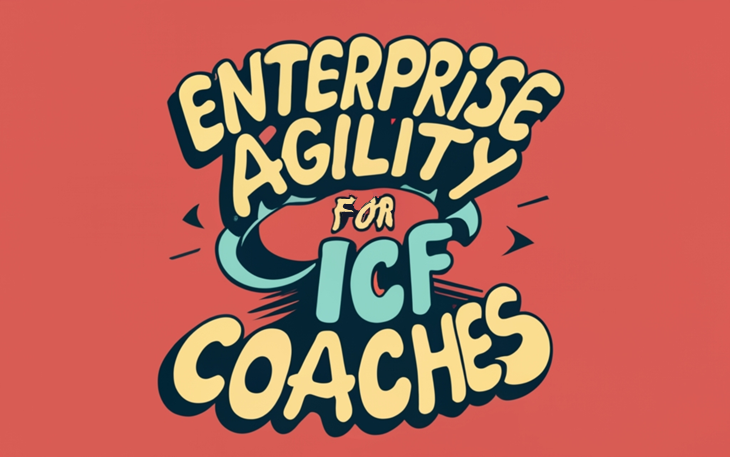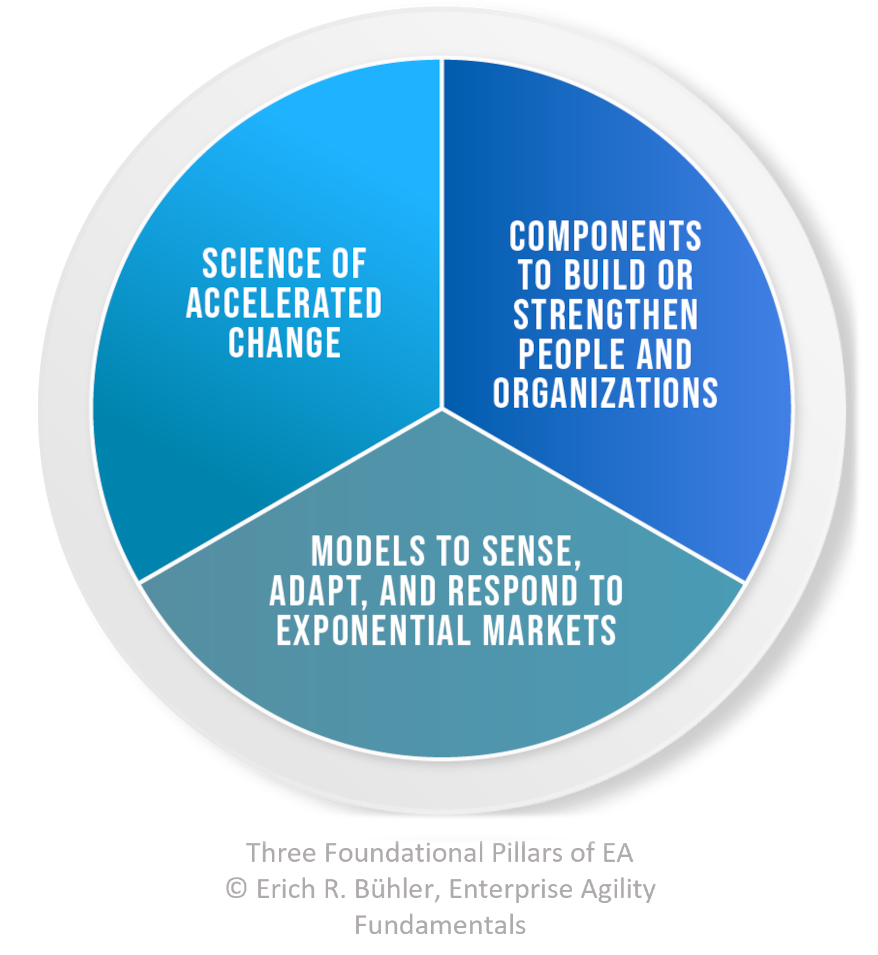Enterprise Agility offers a comprehensive way of thinking to empower coaches and their clients to thrive amid constant change.

We understand the challenges leaders face guiding their organizations through today's volatile markets. While Agile, Scrum, and other frameworks brought immense value, accelerating disruption now demands new mental models, capabilities, and tools.
That's where Enterprise Agility comes in. Developed by Erich R. Bühler and the Enterprise Agility University, this ecosystem integrates proven concepts to help companies deal with the new accelerated reality.

At its core, Enterprise Agility applies scientific insights on human behavior, neuroscience, and strategic innovation. For instance, the Science of Accelerated Change examines how people react to accelerated change, leverage neuroplasticity for growth, and sustain strategic mobility in order to understand how leaders can mobilize people despite uncertainty. These evidence-based foundations equip organizations to accelerate transformation and strengthen their resilience.
Enterprise Agility also provides practical components leaders can implement to realign strategies in record time, delight customers and other stakeholders, and optimize organizational health. The TriValue Company Model balances customer value, company value, and employee wellbeing. Meanwhile, tools like the Enterprise Agility Dynamic Radar dynamically assess capabilities across eight dimensions.
Enterprise Agility offers models to actively sense market changes, run experiments, and implement adaptations quickly.
Enterprise Agility offers Future Thinking techniques help companies continuously realign products and services to emerging customer needs.
As a coach, you can leverage Enterprise Agility to strengthen your clients' leadership abilities, ignite their creativity, and expand their perspective. With an extensive toolbox and flexible frameworks, you can tailor your approach to each leader and organization.
From our perspective, the ICF core competencies of coaching presence, active listening, powerful questioning, and direct communication align very well with the principles of Enterprise Agility.
Having coaching skills helps create an environment where people feel seen, heard, empowered to grow, and be part of the group (EA Universal Agreements). This also ties directly to the Enterprise Agility focus on workforce wellbeing, which is connected to the TriValue Company model.

Additionally, the Sense Myself Framework can provide a lot of value to coaches working with leaders and can support many of the ICF Core competencies:
Coaching also promotes self-awareness, accountability, and continuous learning—all important for increasing Mental Agility (a crucial component in EA) and adaptability. The coaching process itself uses reframing. EA has several models to support reframing during disruptive times and where there are higher levels of stress.
While Enterprise Agility focuses on dealing with accelerated change and its impact on humans, coaching Skills from ICF can empower other areas.
Finally, the concept of Shared Progress can be very relevant here. The Shared Progress framework emphasizes several crucial dimensions to model in cultures mutual benefit, collaboration, and advocating partnership during accelerated times.
As an ICF coach, you can intentionally apply these principles during your coaching conversations to catalyze positive change beyond just the individual. Ask powerful questions to expand worldviews. Highlight how the client's success depends on others. Define success measures based on shared value creation (customer, company, and workforce wellbeing). Demonstrate behaviors like transparency and empowerment. Advocate philosophies of mutual benefits collaboration across teams.
While an ICF coaching session is shorter than an EA intervention, focusing on Shared Progress will amplify your positive impact. The micro-interactions can cumulatively help shift mindsets and systems to be more learning-oriented, innovative and adaptable. This complements the ICF's goal of developing a coaching culture.
ICF coaches are invaluable partners in Enterprise Agility journeys. They provide critical support through their focus on self-awareness, listening, questioning, and facilitation skills.
ICF techniques encourage slowing down— which is complementary to EA's acceleration in culture and markets. This balanced approach helps leaders evolve mindsets, behaviors and systems while maintaining intellectual humility, empathy and psychological safety during change.
ICF coaches can indeed nurture Mental Agility in individuals and model EA concepts during conversations. Their scope is often concentrated on the coachee versus the full enterprise. There is huge potential for them to expand their impact by also advocating for broader systemic change and cross-functional collaboration.
But that's not all! Enterprise Agility also offers tools like Hanna or Laura's AI with Hypercustomization, allowing you to customize any organizational framework to your client-specific coaching situations or needs.
Are you ready to embark into the Enterprise Agility Way of Thinking?
